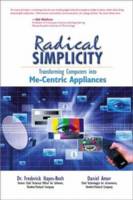Interview between Radio Singapore International and Rick Hayes-Roth.
Below you can find the questions asked. If you are interested in hearing the answers, download the audio-file (requires Microsoft Mediaplayer).
The following Interview was broadcasted on Radio Singapore International on 10th April 2003
Written and Presented by Alison Overholt
Produced by Augustine Anthuvan
Hello, you’re listening to On the Line from Silicon Valley, I’m Alison Overholt. Today we’re speaking with Dr. Frederick Hayes-Roth, former Chief Technology Officer of software at Hewlett Packard. He is the author of a new book called Radical Simplicity:
Transforming Computers into Me-Centric Appliances. In the book, Dr. Hayes-Roth suggests that a dramatic shift is about to take place in the computer industry that we are on the verge of an era of intelligent computing, in which our machines learn how to work with us, instead of the other way around. Dr. Hayes-Roth, welcome to the program.
Tell us a little bit about your book.
How do you see the computer industry changing in the near future?
We’ve been hearing that artificial intelligence, mass customization, and learning machines are the future of technology for a long time now I think they’ve been the 'next big thing' in technology for at least the last decade, if not longer. Why do you think the time is right for this shift to take place now?
Can you give us some examples of companies and technologies that are already making this shift? What’s on the market right now that has the kind of capabilities you’ve been talking about?
What is missing from the picture at the moment what is preventing the larger technology industry from embracing this view of computing? (And when do you think they might come around?)
Rick Hayes-Roth, former CTO of Software for HP, recently wrote a book called Radical Simplicity that is just now hitting store shelves. The book details the futuristic concept of "me-centric" computing, or computing that "fits into an individual's life in a natural way."
Here's more of a description of the book and Hayes-Roth's ideas:
"This technology is called me-centric because it fits into the individual's life in a natural way, conforming to preferences and requirements, taking orders, and performing a variety of delegated tasks. In me-centric, computing, every appliance becomes part of your environment, your team, your extension. Readers will find out about the key technologies that are collectively creating these functions, how they work, and how they work together. "
